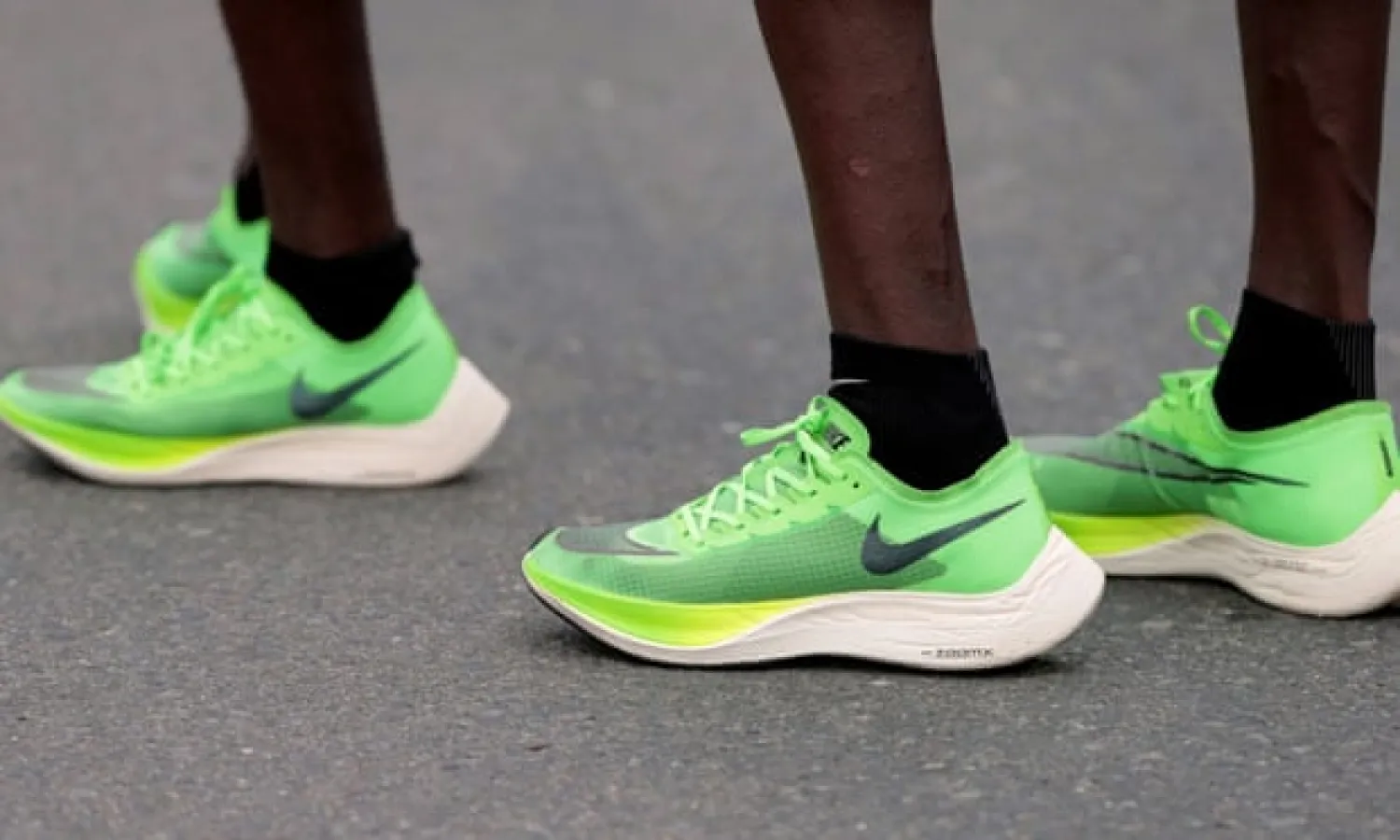There was a guy at parkrun the weekend before last wearing a pair of lime-green Vaporflys on the start line. At least he looked suitably sheepish about it – pointedly ignoring the sharp whispers, the discreet pointing, the gentle ribbing from his running club mates. With its clownish platform heels and lurid alien colour scheme, the Vaporfly is not a shoe for blending into the crowd. Even in a field of 600 anonymous runners the eye is always going to be drawn to the one wearing what looks like a mutant tropical fish on each foot. The race began and off he streaked: a blur of lime-green disappearing into the distance, leaving the rest of us, with our boring reasonably-priced shoes and sniggering moral judgments, in his dust.
Of course, it’s easy to scoff when the stakes are minuscule. Turning up for your local Saturday morning fun run in £250 space-age trainers: objectively very funny, and largely analogous to the guy who wears his Lionel Messi astro boots to Wednesday five-a-side (and leaves with several painful stud-shaped indentations in his ankle). What happens, though, when the stakes are far higher? When the prize is an Olympic gold medal, when the audience is global, when the margins are life-changing? Should it matter what shoes the competitors are wearing? And if not, why not?
These are some of the questions with which athletics has been grappling in recent months. In a way they go well beyond the optimum thickness of a nitrogen-infused midsole or whether two carbon plates should be allowed to overlap. No question of sporting ethics can be resolved purely through science and, by the same token, the terms of our emotional engagement are far too important to be dictated by administrators bearing formulae. The question of the Nike Vaporflys – and its successor models – is thus one that cuts to the very core of what sport is about, or should be.
By now readers will be aware of how Vaporfly-shod athletes have been laying waste to the record books, quietly and quickly changing the face of the sport. Eight of the 12 fastest men’s or women’s marathons in history have been run in the last 18 months. In October, in Vienna, Eliud Kipchoge became the first man to run the marathon distance in under two hours. The prototype Alphafly shoes he wore for that effort are banned but last month World Athletics retroactively declared the Vaporflys legal as well as the records set in them.
The first point to make here – although in the scale of things, not a terrifically helpful one – is that Nike have done nothing illegal or even that novel. Carbon plates date back to the early 2000s, with Paul Tergat breaking the marathon world record in a pair of Filas in 2003. Nor is there much new in the deployment of energy-efficient foam, which Adidas first pioneered almost a decade ago. Nike’s stroke of insight has been to synthesise largely existent technologies into a single devastating package, one that with the backing of World Athletics has in effect rewritten the terms of distance running. Either you join the arms race (if, that is, you can negotiate Nike’s imperial battalion of patent lawyers). Or you lose.
You don’t have to be a luddite or a nostalgic to wonder about where this vision of athletics might ultimately lead. For those at the vanguard of the revolution these are genuinely transformative times – a chance to rebrand athletics as a high-powered, jaw-dropping spectator entertainment. When Kipchoge states, with all the evangelical zeal of a tech bro in a headset giving a Ted talk, that “we must go with technology” and compares Nike’s trainer innovation with the role of tyre manufacturers in Formula One, he is articulating an entirely different sort of sport from the one we grew up with: one in which the turning wheel of technological progress is not merely an auxiliary sideshow but part of the spectacle itself.
The main gripe here is not driven by ideology or anti-progress. We are not talking about returning to cinder tracks and putting everyone in Dunlop Green Flash. Nor is it the increasingly corrosive influence of Nike on athletics, an entire sport now in effect in thrall to a single company; nor the inevitable human wastage of athletes physiologically unsuited to the new technology or sponsored by companies unable to replicate it or simply unable to afford it; nor even the colossal environmental dereliction of a shoe that has to be thrown away after 200 miles of use.
No, the real point is this: in the same way that nobody reads novels to marvel at the typeface, nobody watches athletics – in many ways the oldest and purest sport of all – to gawp at the trainers. Do you know how many butt-numbingly boring articles about shoe technology I had to read before I could start writing this column? Even its very existence feels like the triumph of the inane over the essential, a lame surrender to the Nike marketing octopus. (Woman in Nike’s PR department, reading Vaporfly’s press coverage: “Oh, no. Another article criticising our shoes for being too fast. How utterly terrible.”)
But then, if you’re a sport in 2020 and not somehow facilitating disposable parasite-consumerism, then do you even really exist? Perhaps once, long ago, before we were terminally jaded by doping scandals, we could still cling to the idea that athletics somehow represented the very best of us as a species; that its feats might inspire us, rather than simply inspire us to buy trainers; that this was genuinely a sport operating by the laws of the body, not the laws of the market. Or perhaps this too was always delusion: a lime-green speck on the horizon, gently receding ever further into the distance.
The Guardian Sport









